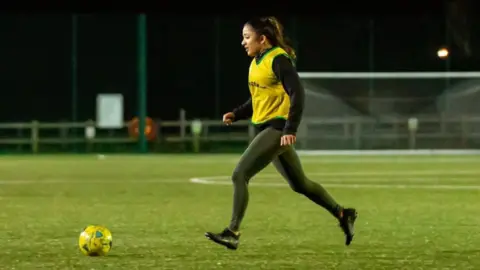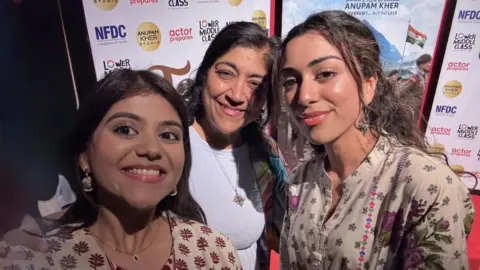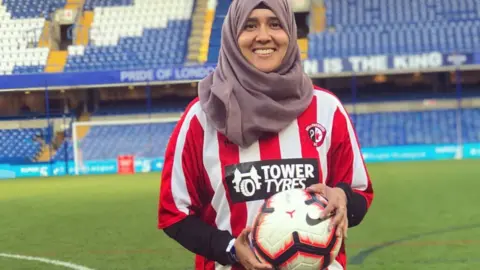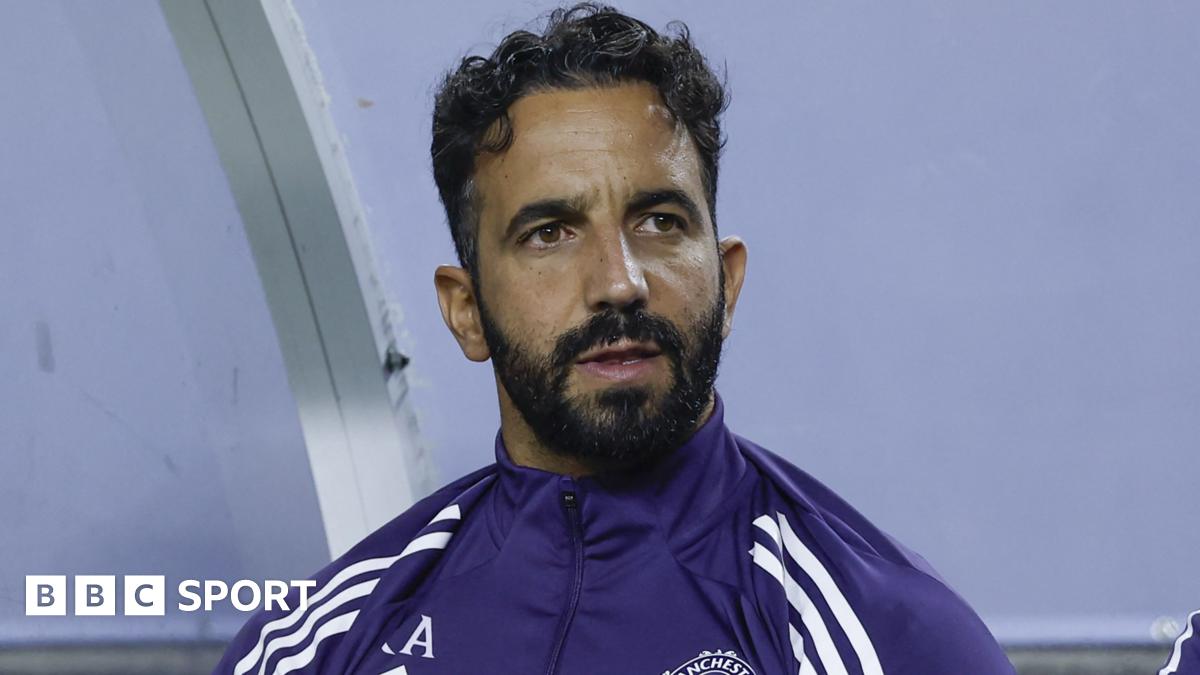
 Simran Sandhu
Simran Sandhu
Simran Sandhu says she wasn't allowed to join a football team until she was 14
Growing up, Simran Sandhu just wanted to play football.
She loved having a kick around the garden with her brothers, but her Punjabi dad wasn't keen on her joining a team. He didn't even like her playing FIFA on the PlayStation. Football was a boys' sport, he said.
Simran was jealous of her younger brothers, who were allowed to play on teams and who she spent her weekends watching from the sidelines.
"Even when it came to just playing in the garden I'd noticed silly things like my dad would be paying more attention to my brother, passing the ball to him more," Simran, now 23, says.

 Simran Sandhu
Simran Sandhu
Simran wanted to join a football team like her younger brothers
It wasn't until Simran was 14 that her dad let her join a team.
And around that time, she also first watched Bend It Like Beckham - and was surprised by how much Gurinder Chadha's 2002 film reflected her experience.
People would point to Jesminder Bhamra, the film's main character, and say, "That's literally you", Simran says."When I heard the title, I didn't expect it to be so close to my heart. It made me feel heard and seen."

 Simran Sandhu
Simran Sandhu
Simran loved football from a young age
The film focuses on Jesminder's passion for football and her Punjabi parents' resistance to her playing the sport. They're more concerned about her sister's upcoming wedding and Jesminder staying out of trouble.
Jesminder, or Jess, as she's known, has to sneak behind her parents' backs as she joins a girls' team with her friend, Jules. The film, peppered with witty one-liners and iconic scenes, follows the teen's attempts to placate her family while chasing her dream of getting scouted.
A sequel is now on the cards, Chadha said last month.
"We've been part of changing the game for women, so it felt like this was a good time for me to go back and investigate the characters," she said, suggesting that the new instalment could come out in 2027, which would mark the film's 25th anniversary.
BBC News spoke to women about the film's legacy.
"I wanted to be Jess," says Maz Ullah, who's watched Bend It Like Beckham dozens of times. "I'd never seen a brown girl on TV who represented me so well."
Maz rented the film from Blockbuster in the early 2000s. It was a "mirror" of her life, she says.

 Maz Ullah
Maz Ullah
Maz says her dad wouldn't let her play football
When she was young, her dad - himself a huge football fan - took her to a shop and told her she could pick any sport to start. But when she chose football, "he was like, 'Except for football, you can't play football, you should play tennis,'" Maz says.
The concept of female footballers was "alien" to her dad, she says. "That conversation and that attitude impacted my confidence."
Maz gave up her dream of playing.
Though some people of Indian heritage told the BBC the film represented their culture well, Northumbria University's Dr Aarti Ratna, who researches Asian representation in sport, says the film draws on some stereotypes and many South Asian female footballs do actually have enthusiastic parents.
This was the case for Riya Mannu, who plays for Birmingham City FC.
"My dad didn't question it when I said I wanted to play," the 18-year-old says. But she still faced barriers, including having to join a boys' team when she was eight because she couldn't find any girls' ones nearby.
Riya says she's watched the film, which starred Keira Knightley and Parminder Nagra, dozens of times. She even saw a stage adaptation and got a photo with Chadha. It was one of the things that inspired her to become a footballer, she says.
Even people who don't follow football say the film has had a huge impact because of its representation of South Asian culture.
"It was a staple in a brown household," says Jasmine Rai, 25, adding it was "the first time I saw a brown girl in a positive light" in a film.
Her friend Natasha Retnasingam, 25, says she's watched the film at least 20 times - "I can recite that movie," Natasha says. "For me, it was less about football and more about the fact you can go after your goals no matter what."

 Jasmine Rai and Natasha Retnasingam
Jasmine Rai and Natasha Retnasingam
Jasmine Rai and Natasha Retnasingam, pictured with Bend It Like Beckham director Gurinder Chadha, praised the film's portrayal of South Asian families
Yasmin Hussain watched the film when she was a teenager. "It was needed," she says. "It was the first time I've ever seen something like that on TV."
By the time she watched the film, in the early 2000s, Yasmin had already given up on the sport because she couldn't find a team with a female coach nearby. Before that, she'd been playing with brothers and his friends on the street, but "it was an environment my parents didn't feel that was appropriate or safe for me."
"I knew that it's something that I won't be able to be doing long," Yasmin says. "It was just basically a matter of when it was I had to give it up. I didn't think it would be as soon as the age of 13."
In the 23 years since the film came out, women's football in the UK has changed massively, says Prof Hanya Pielichaty of the University of Lincoln, who researches gender and sport.
- Five reasons the film is still iconic
- Bend it Like Beckham inspires footballer's career
- Why we need to talk about periods, breasts and injuries in women's sport
"Finally, people are starting to take women's football seriously, injecting it with sponsorship, with cash, with facilities, allowing women to be full-time footballers rather than a full-time lawyer and a footballer on the side," she says. "It didn't seem like it would ever happen."
There have been changes in grassroots football, too, she says. When Bend It Like Beckham came out "we were playing in men's old football kit, we were getting changed in toilets or shabby changing rooms, doing the best that we could, putting in two pounds a week to contribute to the referee," says Prof Pielichaty, who played football for more than 20 years.
While there's been huge progress, "there's still some girls fighting to get teams, there's still lots of parents of female footballers having to pay money to get kits and to be in an academy structure," she says.

 Handout
Handout
Yasmin returned to football as a coach
Some of the women the BBC spoke to kept playing football, like Simran, who played for her university team.
About two decades after she stopped playing, Yasmin finally returned to football in 2017 by training as a coach. She hopes to give girls from South Asian communities the opportunities she didn't have when she was younger.
"Girls don't see it as a boys' sport anymore," she says.
The film's fans say they're excited for the sequel, which they hope will see Jess and Jules return to screens while marking the Lionesses' success, and hope will inspire a new generation of footballers.
Some fans wonder if a sequel could live up to the original, though.
"Another Bend It Like Beckham would be amazing," Riya says," but would it be as good as the first one?"

 9 hours ago
2
9 hours ago
2









